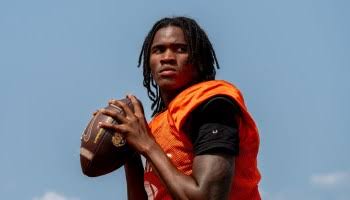What was once a honeymoon period for Lincoln Riley at USC has now turned into a storm of uncertainty. The latest blow came when five-star quarterback Julian Lewis, a cornerstone of the Trojans’ future, flipped his commitment from USC to Deion Sanders and the Colorado Buffaloes. The loss is not just about a single player—it symbolizes the mounting pressure and shifting dynamics in the college football world that Riley now finds himself navigating.
Lewis, one of the top-rated quarterbacks in the 2025 class, had been the centerpiece of USC’s recruiting efforts. A polished passer with elite arm strength, accuracy, and poise, Lewis was seen as the next great Trojan QB, following in the footsteps of Caleb Williams and Matt Leinart. His decision to decommit and pledge allegiance to Colorado is a jarring setback for Riley’s vision of the program.
For USC fans and insiders, the move stings even more considering who won the battle—Coach Prime. Deion Sanders has injected new energy into Colorado football, leveraging his charisma, NFL pedigree, and savvy use of NIL (Name, Image, and Likeness) opportunities to attract blue-chip talent. Lewis’ flip is perhaps the most high-profile example of this strategy paying off.
Meanwhile, Lincoln Riley, once hailed as the quarterback whisperer, is facing tough questions. After a disappointing 2024 season that saw the Trojans stumble to a mediocre finish and fail to meet lofty expectations, the momentum that Riley brought with him from Oklahoma has largely dissipated. Fans have grown restless. Critics point to defensive struggles, culture issues, and now, recruiting losses as signs that the USC machine may be stalling under Riley’s watch.
Compounding the problem is the ever-changing landscape of college athletics. The announcement of a proposed $923 million revenue-sharing model between schools and athletes across major conferences is reshaping the recruiting battlefield. With more than 2,200 athletes expected to benefit, programs with innovative NIL infrastructures and aggressive collectives are gaining an edge. USC, once the glamour destination in college football, now finds itself in fierce competition not just with SEC giants, but with upstarts like Colorado who have fully embraced the new era.
For Riley, this is a critical juncture. While the talent in his program remains strong, with young stars waiting in the wings, the optics are troubling. Losing a quarterback like Julian Lewis doesn’t just hurt depth—it undermines the narrative that USC is the go-to destination for elite quarterbacks.
The Trojans will now have to reassess their 2025 recruiting strategy and look to regain momentum quickly. Riley’s offensive acumen is unquestioned, but unless he stabilizes recruiting and addresses lingering roster issues, particularly on defense, the pressure will only grow louder.
As USC prepares to enter the Big Ten, the stakes are higher than ever. Lincoln Riley isn’t just fighting for a return to national prominence—he’s fighting to protect the legacy he’s trying to build in Los Angeles. Whether he can weather this storm remains to be seen, but the road ahead is undoubtedly tougher than he envisioned when he first arrived at USC.
